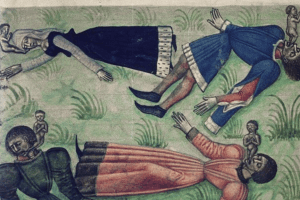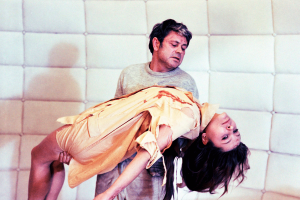Dear Sir / Madam,
This will be quick, just the way you like your literature, your sex, and your politics—even if you can’t tell one from the other—. Three minutes later there’s too much information, too much thickness; you can’t understand a text but as a photo caption. Three minutes later, the Essequibo must be saved. Three minutes later, you’d like to fast-forward to the cum shot. No need to be mindful: this doesn’t have buttons, and nothing will happen if you strike the paper twice with your fat little finger, but it will be fast, because the truth is that neither you nor I have too much to say: the revolution has taught us well.
However, we are not the same. I prefer a photo capture. We, the fetishists, are the gods of foreplay. Every day I pray for the others to keep the Essequibo. Once at it, I also wish the Orinoco, the Gulf of Coquivacoa and the Arauca-vibrador were taken away; it has already been shown that we have no dexterity—none—to govern ourselves. What a beautiful double denial there! So vernacular! The adverb «no» is a holocaust vertigo that can be combined, in Castilian, with other negative sense elements: not nobody, not nothing, not ever. And since our language doesn’t care for mathematics, two negative signs do not yield a positive one but radicalize the “no,” making it an absolute figure—all public officials know this already—. I hope you will forgive this long digression, but, put to reproach, the prooemiun is necessary and, in any case, I am writing this to say ‘no’ twice.
Your letter reminded me of a phrase by Jose Agustín, the poet of the Goytisolo. It bothered him to receive so many books, he said, by lousy poets asking for his opinion. I know I am bold to compare myself with the old Catalan fox, but that is exactly where the little book you sent me, and the admiration you claim to feel for me, have taken me. It is a strange honor that I certainly don’t deserve, but of which I will try to be worthy. You belong to that new gang of virtual reality poets that confuse social media posts with literature, life with Facebook. Let me explain—don’t worry, I will be brief—the differences: Literature is a post that lasts for five hundred years. And life is just the petty name we give to the substance that refuses to become a post or literature.
Of course, there may be poetry on the Internet, but it is not your case. You are a poet-socialite who writes for recitals and fashion shows, now that social networks have made it possible for anyone to become a porn star. This is about the confluence of two phenomena that represent the fate of our time: an “inner” voice that encourages the most ridiculous aspirations and the enormous possibilities of distribution of such aspirations. We are all specialists: political scientists, models, economists… and poets. These are not mutually exclusive: you are a poet-socialite who, as such, should have political opinions (preferably lukewarm ones) and the image of an overweight poet with big eyeglasses. Like a washed-out, harmless Miyó Vestrini look.
So this is the legacy of Apocalipsis, the water of disasters? This is what Tráfico, Armando Rojas Guardia’s monstrous solemnity, was wasted for? To be forced to read, for the thousandth time, the urban poems of some silly girl who wants to be a thug because she could not be a princess? To withstand the arrogance of any forty-year-old macho who confuses impudence with wit? To hear, ad nauseam, the feminine poems of a divorced lady, or, what is worse, a married lady? And what will we do with this pile of pages filled with confessions and yearnings? What will we do with your little book when you win the next contest by unanimous decision of a jury composed of its obscene lineage?
There are your cyber-friends and followers, your colleagues: the mistresses and divorcés, the middle-aged Don Juan, the not-so-young-poets, the young, the queer, the well-meaning, the Aquarians, and the beer-damned. There they are, at their jammings, tinkling their drinks, hunting for redundancies, patting each other’s backs. There they are: they write a lot and recite more, they accept any invitation because “the important thing is the poetry,” they attack the government and the opposition, they have a thirst for likes.
Meanwhile, poetry remains deaf to their tantrums and mine: it is living on the edge at the limit of language, the cold where words (written with blood) can’t be erased. To write is not to count memories, trips, loves and losses, dreams and fantasies, but to reconstruct the never-after lived, that which neither death nor the heavens can touch. One doesn’t write because of the wish to communicate; rather, something begins to be written in spite of us when we intuit that not everything can be communicated, that words break, open, catch fire. Poetry is what that effect of silence is called. Poetry is the general name of every effort of the imagination that will never be humbled by its anecdotes and its cries.
So, if poetry is safe from you, even if that’s how you obscenely call your foolishness, why does your work repel me? Why do I present you my arguments? What do I want to defend? Such questions accompanied me for a while, and yesterday morning I understood. I was sitting in the crowded car that drags my bones from the west to the east of the city every day, and vice versa, when I saw a girl in the front seat crushed by the man at her side. His legs were grotesquely spread, while she twisted herself to fit into a corner. Some feminists have already begun to denounce such situations as acts of micro-machismo. What I am defending from you is public space: you occupy too much of it.
The problem is that the poets are dying; you don’t understand. Montejo left the galaxy, he rests on a remote planet and my voice can’t reach him. Nobody has seen Crespo in over fifteen years. Hanni swayed away. Ida, Enriqueta, Tortolero are also gone forever; you don’t understand. The poets are dying: Lancini, Palomares, Muñoz, Barroeta, all have died. Cadenas no longer rides the bus. Liscano, Silva Estrada, Sánchez Peláez watch us from the dark, shaking their heads. My country’s poets are dying, and when I step into a bookstore I find you, reading bullshit.
You are only challenged, from the cowardly anonymity of a website or a ghost Twitter account, by people of your own kind. Otherwise, you rule over your small virtual country. Your tyranny is implacable: you vigorously persecute those who express what you consider an inappropriate opinion. And your insolence is so high, your decay so immense, that in your Leonardesque delirium you judge all kinds of issues: editorial politics, suicide, young poetry, astrology, economics, electoral processes, human rights, psychology, and the purring of the cats.
I don’t know if it was Pliny the Younger or the Elder who said that no book is so bad that it can’t serve any purpose, but the other day I tried to hold the door with yours and it closed onto my face. See? You dispute the classics, even. This response is an anachronistic, deferred, refined gesture: an interdict. If I write this as a letter it is only because I need to exist in it, to exaggerate the authoric grimace, the illusion that will make you believe that it was I, Alejandro Castro, who denounced you. Here is my opinion about your sentimental poems. I dare wish that this double, triple, rejection may reach you in digital format, to see if you’ll read it. Zuckerberg, Chávez, and Coelho have caused you irreparable damage: you deserve nothing; you can’t become anything just by wanting to; happiness is not a hashtag, nor can it exist in this world of readings and presentations. Don’t write, what you write interests no one, don’t write, never, never ever.
About the author:
Alejandro Castro (1986) is one of the most relevant new voices of Venezuelan literature. In 2011, his book No es por vicio ni por fornicio. Uranismo y otras parafilias was awarded the Monte Ávila Prize for Unpublished Authors. In 2013 he published El lejano oeste (bid & co editor, Caracas).
















